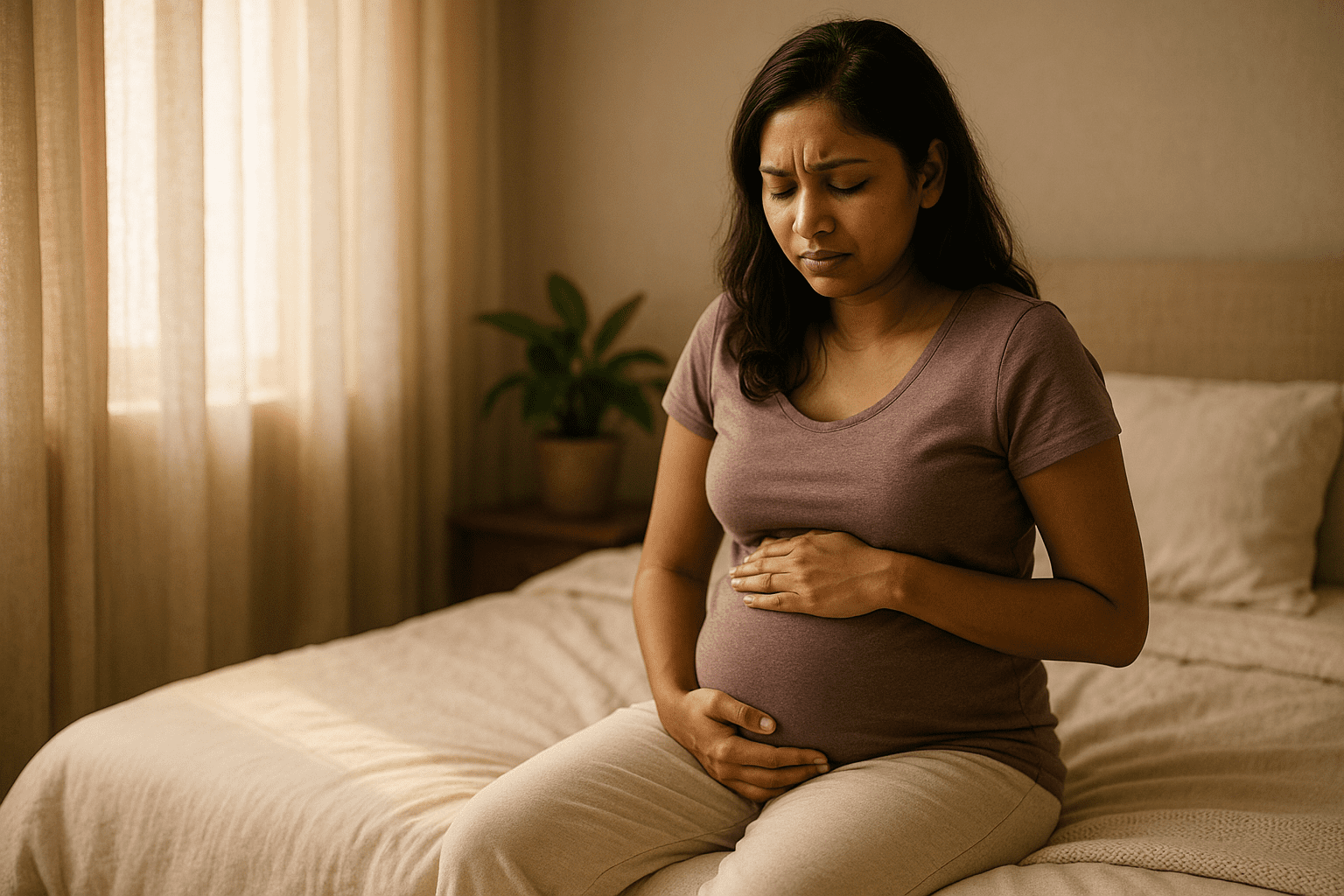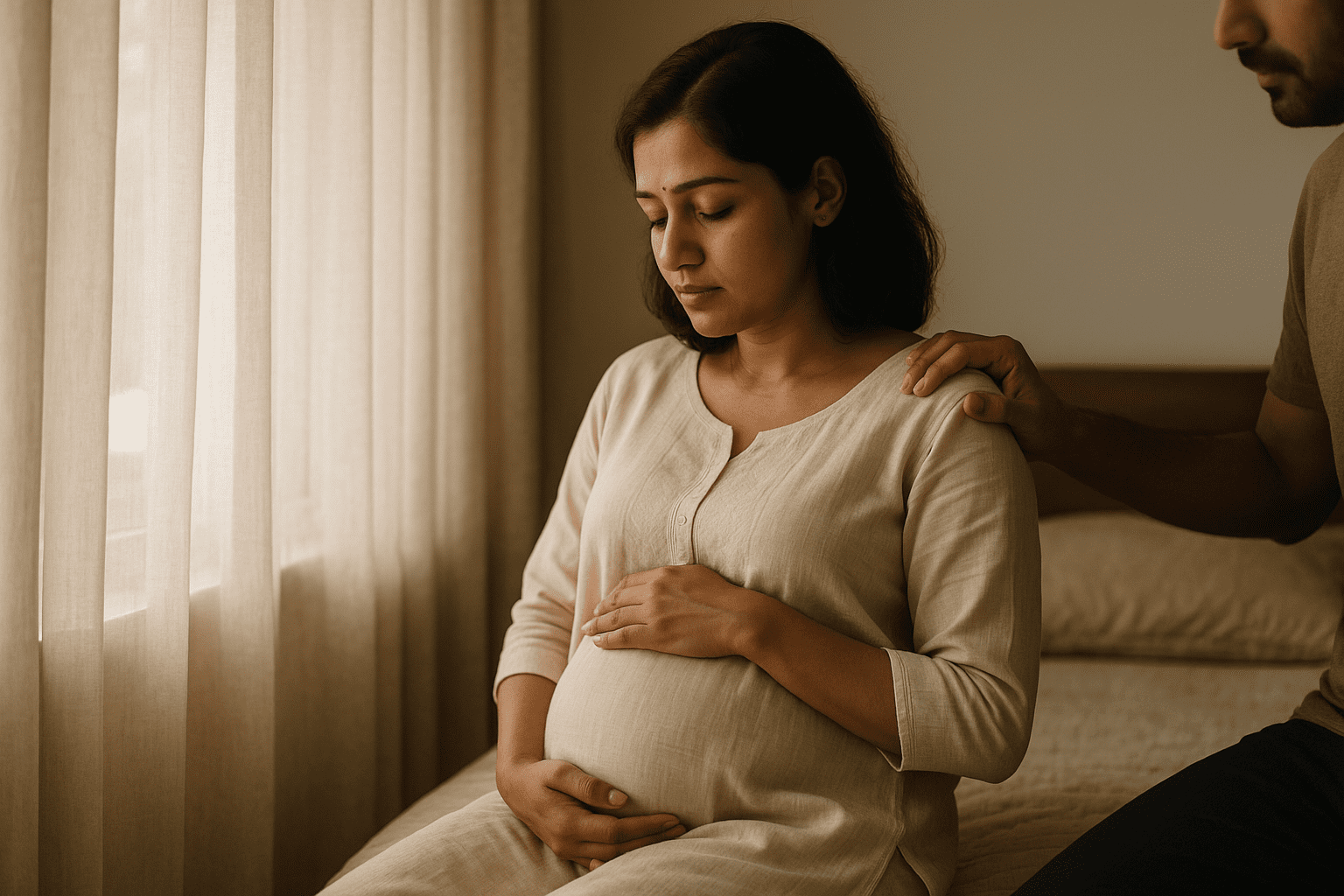It’s a feeling many expectant mothers know all too well — a sudden cramp in your lower belly that makes you pause mid-step. In my clinic, this is one of the most common concerns during early and mid-pregnancy. So if you’ve Googled “cramps during pregnancy” at 2 a.m., you’re not alone.
Let’s break it down gently.
What Do Cramps During Pregnancy Feel Like?
Cramps during pregnancy are usually mild, pulling sensations in your lower abdomen or back. They can feel like period cramps, especially in the first trimester. Some women describe them as sharp twinges or pressure.
As your uterus expands to make room for your baby, these sensations are often a normal part of the process.
Common Causes of Cramps During Pregnancy
| Cause | Description |
|---|---|
| Implantation | Mild cramps when the fertilized egg attaches to the uterus |
| Uterine Growth | Stretching of the uterus as baby grows |
| Gas & Constipation | Slower digestion causing discomfort |
| Round Ligament Pain | Sharp pain from ligament stretching |
| Braxton Hicks | Irregular, practice contractions later in pregnancy |
1. Implantation Cramps (Early Pregnancy)
These occur when the fertilized egg attaches to the uterine lining. You might feel them around the time your period is due.
2. Uterine Growth
As your baby grows, your uterus stretches, which can trigger mild discomfort or cramping, especially when you move suddenly or sneeze.
3. Gas and Constipation
Hormonal changes can slow digestion, leading to bloating, gas, and sometimes painful cramps during pregnancy.
4. Round Ligament Pain
A sharp, shooting pain on one or both sides of your lower belly, usually during the second trimester. This happens as ligaments stretch to support your growing uterus.
5. Braxton Hicks Contractions
These “practice contractions” often feel like mild cramps and usually come later in pregnancy. They’re irregular and go away with rest.
When Should You Worry About Cramps During Pregnancy?
While most cramps during pregnancy are harmless, there are times when you should speak to your doctor:
- Severe or persistent pain
- Bleeding or spotting
- Fever or chills
- Dizziness or unusual discharge
I once had a patient, a first-time mom in her 30s, who came in worried about cramps at 14 weeks. She had no other symptoms, but the pain was strong enough to scare her. An ultrasound revealed a mild round ligament strain — not dangerous, but definitely uncomfortable. With a belly band and some rest, she felt much better within a week. Knowing the cause helped ease her anxiety more than anything else.
How to Relieve Cramps During Pregnancy

- Stay hydrated
- Change positions slowly
- Use a warm (not hot) water bottle on your lower back
- Gentle stretching or prenatal yoga
- Increase fiber to avoid constipation
If your cramps during pregnancy are linked to gas, try eating smaller meals and avoiding trigger foods like fried or spicy dishes.
Cramping in the third trimester could mean different things. It might be Braxton Hicks or early signs of labor. Timing the cramps and checking if they increase in intensity can help you distinguish between the two.
You can read more about important timings and symptoms in Crucial Week of Pregnancy.
For further reading, the Mayo Clinic’s guide on pregnancy symptoms is a reliable resource.
FAQs
Q1: Are cramps in early pregnancy a sign of miscarriage? Not always. Mild cramping is common. But if it’s severe or accompanied by bleeding, call your doctor.
Q2: Can dehydration cause cramps during pregnancy? Yes. Dehydration can lead to uterine irritability and cramps. Drink plenty of water daily.
Q3: What do Braxton Hicks feel like compared to real contractions? Braxton Hicks are irregular and usually painless. True labor contractions are regular, get stronger, and don’t go away with rest.
Final Thoughts
Cramps during pregnancy can be worrying, especially if it’s your first time. But most are part of your body’s beautiful adaptation process. When I was carrying Sreyansh, I had frequent cramps around week 20. It turned out to be round ligament pain, but the reassurance from my own OB-GYN helped me relax. That’s what I hope to offer you too.
If you’re ever in doubt, reach out. It’s better to ask than to stress.

Meet Dr. Sonia Iyer — a seasoned gynecologist, mom of two, and trusted voice for women navigating the beautiful chaos of pregnancy and early motherhood. With over 11 years of clinical experience and a deep understanding of real-life parenting, she brings clear, compassionate, and expert-backed advice to every blog she writes.




Pingback: How to Get Pregnant: 7 Honest Tips for Indian Women